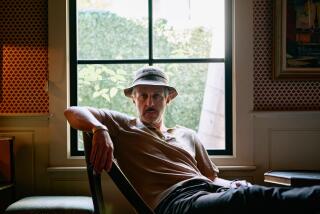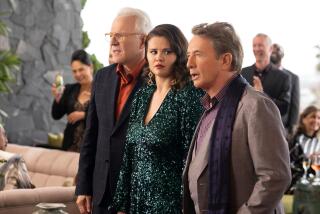With more than 8 key roles, you’d think casting ‘Chicago 7’ would be tough. It wasn’t
This season’s most daunting casting challenge surely must have been the largest ensemble film among the best picture Oscar nominees. “The Trial of the Chicago 7” features a radical collection of real-life characters brought to life by actors who deftly sublimated their own personalities beneath wigs, accents and glasses to dramatize a fractious chapter of American history following the 1968 Chicago riots. As writer-director Aaron Sorkin sees it, the film’s success has depended in large part on matching the right actor to each role.
“They say that casting is 90% of the battle, and I think whoever said that dramatically underestimated the importance of casting,” Sorkin notes wryly from his home in L.A. “If you miscast a part, everything you do after that is going to be about making little adjustments along the way.”
“Chicago 7” did not suffer from any kind of actor-to-character misalignment, Sorkin emphasizes. “The chemistry was fantastic,” he says. “Every morning when I came to work, I felt like I was being tossed the keys to a Formula One race car: As long as I didn’t run the car into the wall, these guys were going to win the race.”
In assembling their high-octane cast, many filmmakers have benefited from four words that constitute one of Hollywood’s most attractive forms of actor bait: “Written by Aaron Sorkin.” Casting director Francine Maisler, who worked with Sorkin on “The Newsroom” and his directorial debut, “Molly’s Game,” says, “When the material is at this level, I have an endless number of actors available to consider, because everybody wants to work with Aaron. It makes my job a lot easier.”
Sorkin adds, “For a lot of the roles, it was: ‘If you want to be in this film, raise your hand and step forward.’ That’s what Frank Langella [as Judge Julius Hoffman] did. That’s what John Carroll Lynch [as Dave Dellinger] did. Jeremy Strong really wanted to play Jerry Rubin. And with Michael Keaton, he said, ‘Have you got anyone to play Ramsey Clark yet, because I’d really like that part.’”
Oscar nominee Sacha Baron Cohen, who portrays yippee rabble-rouser Abbie Hoffman, proactively threw his hat in the “Chicago 7” ring after being cast in the role by Steven Spielberg for an earlier incarnation of the film that never came to be. “When Sacha got wind that we were doing ‘Chicago 7,’ he very much made it known that he still wanted to play Abbie,” Sorkin says.
Three other UK-bred actors, Eddie Redmayne, Alex Sharp and Mark Rylance, joined the cast as all-American leftists. “We were not specifically thinking about Eddie, Alex and Mark as English actors,” notes Maisler. “We were thinking that each of them brought something specific and unique to the roles.”
In the case of Oscar winner Redmayne, who portrays Students for a Democratic Society cofounder (and future California state senator) Tom Hayden, the creative brief was simple. “There are a couple of things that an actor can’t fake,” Sorkin says. “An actor can’t fake being smart. And an actor can’t fake being funny. I needed Tom Hayden to have a dry sense of humor. I needed Tom Hayden to be smart. Eddie brought that in spades.”
Juilliard-trained British actor Sharp won the role of antiwar activist Rennie Davis after Sorkin saw him star on Broadway in “The Curious Incident of the Dog in the Night-Time.” The filmmaker says, “My only concern with Alex was that we’d already cast Joseph Gordon-Levitt as [prosecutor] Dick Shultz. If you put Joseph Gordon-Levitt in a time machine and sent him back 10 years, he would look exactly like Alex Sharp. When I expressed that concern to Francine, she told me to shut the hell up. ‘We’re not passing up a chance to get Alex Sharp!’ And I said, ‘You’re right. We’ll figure it out with glasses or something.’”
Bobby Seale proved to be one of the trickier characters to cast, given that the Black Panther spends much of the movie literally bound and gagged in the courtroom. “I knew there would be moments of coverage where the judge tells Bobby to be quiet for the 15th time, but I didn’t know what I was looking for until Francine sent me a reel of work by Yahya Abdul-Mateen II.
“Watching that reel, the power of Yahya’s silence really got to me: This is what I’m looking for. He never auditioned for the part, didn’t even put himself on tape. Yahya’s a few years out of Yale Drama, and I do take into consideration an actor’s training. But just looking at his reel, anybody would’ve cast Yahya. Doesn’t take a genius.”
More to Read
From the Oscars to the Emmys.
Get the Envelope newsletter for exclusive awards season coverage, behind-the-scenes stories from the Envelope podcast and columnist Glenn Whipp’s must-read analysis.
You may occasionally receive promotional content from the Los Angeles Times.







